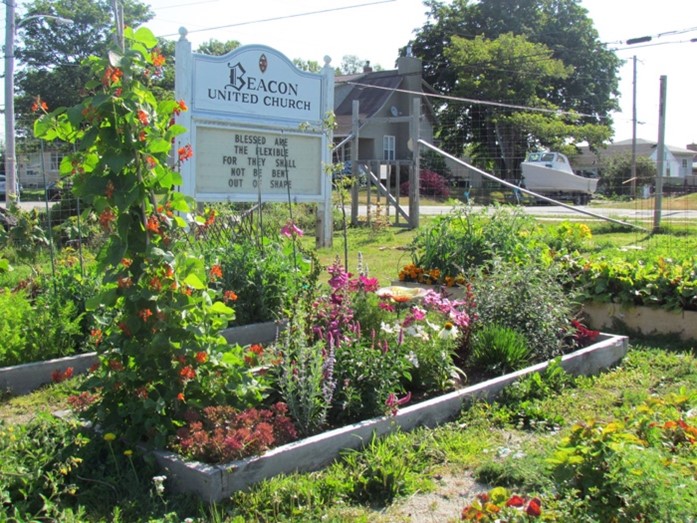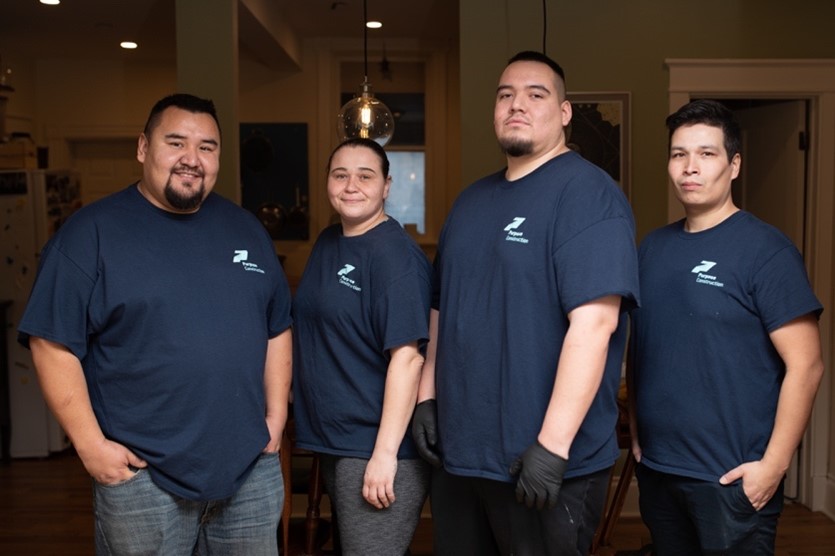Putting our own house in order: faithful footprints

By Lucy Cummings, Faith & the Common Good
Across the country, churches are doing their part to address the climate crisis by getting their houses in order and reducing their own carbon emissions. The United Church of Canada is committed to reducing its own carbon emissions by at least 80% by 2050, in line with the Paris Climate Targets. To meet this target, the church has created a program, in partnership with Faith & the Common Good, called Faithful Footprints. Faithful Footprints offers grants, tools and mentorship to help United Church congregations to reduce their faith building energy usage – the church’s largest source of carbon emissions and costs.
Yet, beyond reducing carbon pollution, Faithful Footprints is also about congregational renewal, community leadership, and ecological justice.
Renewal
For Beacon United in Yarmouth, N.S., energy-efficient actions began as a way to reduce operating expenses. Happily, these actions also started them on a path of renewal — decreased operational costs (reduced fuel usage by 50%), increased community use (community garden capacity is now 180 plots), and increased rental income ($50,000/yr).

Role Model
St. Paul’s United Church in Edmonton was an early leader in reducing their own carbon footprint via a renewable energy installation. For St. Paul’s, according to Rev. Dr. Catherine Faith MacLean, it was a question of “who we want to show ourselves to be” and “how to share the warmth, love and presence of God in our community.” The solar panel installation not only demonstrated care for the community, but also how the church can model how we can work together to address the climate crisis. https://vimeo.com/296741686
Justice
In the prairies, Faithful Footprints is working with Purpose Construction, a construction social enterprise that seeks to provide jobs for folks with barriers to employment. As Purpose Construction’s Kalen Taylor notes, “Participating congregations have the option of working with Purpose Construction to perform energy efficiency upgrades, creating training opportunities in the green building trades for refugees, newcomers, Indigenous peoples and those transitioning out of the justice system.”

“As people of faith, we recognize that to bring truly inspiring climate leadership to our communities, we must practice what we preach,” said Faith & the Common Good’s Lucy Cummings. “Faithful Footprints is about helping United Church congregations to live their climate commitments, for future generations, and for all of Creation.”
TODAY’S RESOURCE
Learn more about Faithful Footprints on their website and read “Climate Justice: Building the World We want to Live in”.
Explore the tools and guides developed by Faith & the Common Good to support faith communities in taking action on sustainability and reducing their carbon emissions.
TODAY’S ACTION
Today’s action is to organize a conversation on climate change. The conversation doesn’t need to happen today, but make a plan and set an intention to do it in the coming weeks. A conversation can take many forms. Here are two examples and some resources to support you:
- Chat with your family or children about climate change around the dinner table this weekend. Here is a great resource from US National Public Radio (NPR) on How to Talk to your Kids About Climate Change.
- Invite members of your church to a conversation on how you can reduce energy consumption as a community. Use Faithful Footprint’s DIY Faith Building Energy Audit Guide, which discusses low or no-cost measures to give operators of religious buildings a range of options they can apply to reduce their energy bills while adding comfort and attractiveness to their facility.
- Plan ahead to invite members of your faith community into small group conversations about understanding climate change or moving towards greater action on climate change. For the Love of Creation, a faith-based initiative for climate justice, will be offering Faithful Climate Conversation guides in English and French by the end of October. Contact flc.pac@gmail.com if you have questions.
 |
Today’s flower on the |
